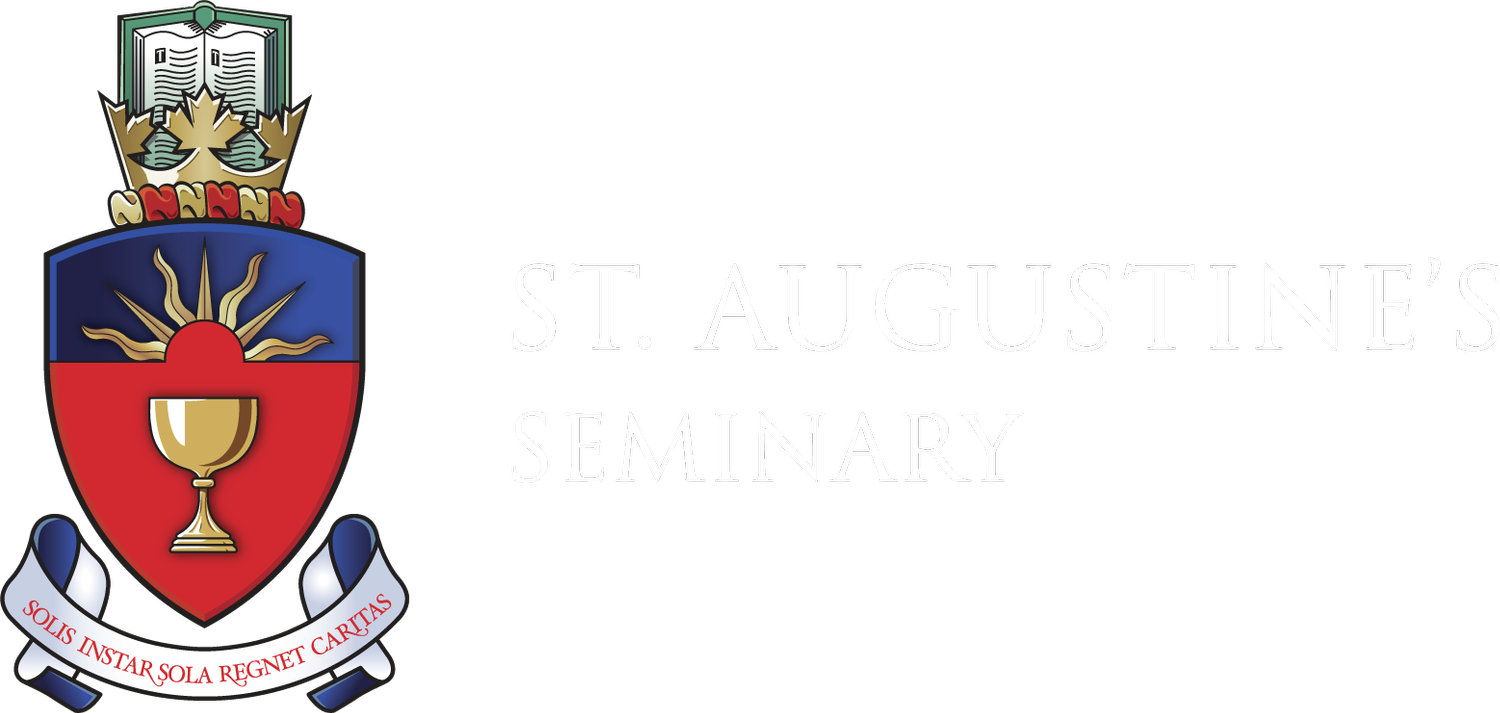Accessibility Services
Accessibility Policy: Providing Goods and Services to People with Disabilities
1. Our mission
The mission of St. Augustine’s Seminary of Toronto is :
St. Augustine's Seminary is the Major Seminary of the Roman Catholic Archdiocese of Toronto. It also welcomes candidates from elsewhere. Its primary purpose is the preparation of candidates for ordained priesthood in the Catholic Church. This preparation for diocesan ministerial leadership embraces and promotes spiritual and human formation, theological education and field training. The Seminary is also mandated to form men and women aspiring to other ministries in the Church.
The Seminary pursues its calling to form candidates as responsible and apostolic persons for the service of the Church and world by fostering
faithful love for Jesus Christ, his Church and all people
commitment to hand on faithfully the tradition, teachings and history of the Church
commitment to the exploration of the mysteries of faith through sustained scriptural and theological inquiry
communal life through sharing faith, prayer and wisdom
The Seminary's mission is undertaken in the context of committed ecumenical engagement as a founding member of the Toronto School of Theology, affiliated with the University of Toronto.
2. Our commitment
St. Augustine’s Seminary of Toronto [SAS] aims to foster an atmosphere of understanding and mutual respect for the worth, dignity and independence of all persons.
SAS will strive to provide support for, and facilitate the accommodation of individuals with disabilities, so that all may share the same level of access to the goods and services provided by St. Augustine’s Seminary. SAS will work to eliminate or minimize the adverse effects of barriers, including physical, environmental, attitudinal, communication and technological barriers, which may prevent the full participation of individuals with disabilities in the SAS community. SAS will seek to provide integrated services whenever possible.
The SAS will provide its employees with education and access to information regarding disability and the SAS’s policies on disability.
At the same time, the SAS will endeavour to protect the individuals' privacy, confidentiality and autonomy.
The SAS affirms that all individuals are expected to satisfy the essential requirements of their program of studies or employment, while recognizing that students and employees with disabilities may require reasonable accommodations to enable them to do so.
St. Augustine’s is committed to acting conscientiously and in keeping with its own policies and existing legislation related to disability. These include:
The Toronto School of Theology’s policy on Accommodations for Students with Disabilities (Paragraph 12 of the Basic Degree Handbook);
Ontario’s Ontarians with Disabilities Act
Ontario’s Accessibility for Ontarians with Disabilities Act
Ontario Human Rights Code
3. Providing goods and services to people with disabilities
SAS is committed to excellence in serving its community including people with disabilities and we will carry out our functions and responsibilities in the following areas:
3.1 Communication
We will communicate with people with disabilities in ways that take into account their disability.
We will train staff members who communicate with the public on how to interact and communicate with people with various types of disabilities.
3.2 Telephone services
SAS will make reasonable efforts to provide accessible telephone service to the students and other members of the public. We will train staff members to communicate over the telephone in clear and plain language and to speak clearly and slowly. We will also make our staff members familiar with telephone technologies intended for people with disabilities. We will offer to communicate with people by regular mail or email if telephone communications is not suitable to their needs.
3.3 Assistive devices
We are committed to serving people with disabilities who use their own assistive devices to obtain, use or benefit from our goods and services. We will ensure that our staff members are trained and familiar with various assistive devices that may be used by persons with disabilities while accessing our goods or services.
We will continue our relationship with the University of Toronto’s Accessibility Services to provide accessible services to our student community.
3.4 Billing
We will make reasonable efforts to provide accessible invoices to all students and members of the public. For this reason invoices will be provided by email on request. We will answer any questions about the content of the invoice in person, by telephone or email.
4. Use of service animals
We are committed to welcoming people with disabilities who are accompanied by a service animal on the parts of our premises that are open to the public and other third parties. We will also ensure that all staff, volunteers and others dealing with the public are properly trained in how to interact with people with disabilities who are accompanied by a service animal.
5. Support Persons
We are committed to welcoming people with disabilities who are accompanied by a support person. Any person with a disability who is accompanied by a support person will be allowed to enter the SAS building with his or her support person. At no time will a person with a disability, who is accompanied by a support person be prevented from having access to his or her support person while on our premises. Fees will not be charged for support persons for admission to any event hosted by SAS for which a fee is charged.
6. Notice of temporary disruption
SAS will provide a public notice in the event of a planned or unexpected disruption in the facilities or services usually used by people with disabilities. This notice will include information about the reason for the disruption, its anticipated duration, and a description of alternative facilities or services, if available.
The notice will be placed on our website and at all public entrances and service areas on our premises.
7. Service animals on Campus
SAS will adhere to U of T’s policy in regard to Service animals. They can be found here:
8. Training for staff
SAS will provide training to all employees, volunteers and others who deal with the public or other third parties on their behalf, and all those who are involved in the development and approvals of accessibility service policies, practices and procedures. All SAS employees and persons who volunteer for SAS will be trained:
This training will be provided for each staff member within a month of his or her commencement of duties.
Training will include the following:
The purposes of the Accessibility for Ontarians with Disabilities Act, 2005 and the requirements of the customer service standard;
How to interact and communicate with people with various types of disabilities;
How to interact with people with disabilities who use an assistive device or require the assistance of a service animal or a support person;
What to do if a person with a disability is having difficulty in accessing SAS ’s goods and services;
The accessibility services available to SAS students through the University of Toronto;
SAS ’s policies, practices and procedures relating to the accessibility service standard.
9. Feedback process
St. Augustine’s welcomes feedback on our accessibility services. Comments can be made to Theresa Kelly, Registrar and Academic Officer, in the following ways:
in person or by regular mail addressed to:
St. Augustine’s Seminary of Toronto 2661 Kingston Road Scarborough, ON M1M 1M3by telephone at: 416-261-7207 x230
by email to: theresa.kelly@utoronto.ca
Students and other members of the public can expect to hear back within ten business days of our receipt of the feedback.
10. Modifications to this or other policies
The SAS is committed to developing accessibility service policies that respect and promote the dignity and independence of people with disabilities. Therefore no changes will be made to this policy before considering the impact on people with disabilities. SAS will make reasonable efforts to modify or amend any policy that does not respect and promote the dignity and independence of people with disabilities.
11. Questions about this policy
This policy exists to achieve service excellence to those members of our community with disabilities. If anyone has questions about this policy, please contact Theresa Kelly by telephone at 416-261-7207 x230 or by email to theresa.kelly@utoronto.ca.
Accessibility
Accessibility means access. It is the ability for everyone, regardless of physical or mental disabilities, to access, use and benefit from everything within their environment. It refers to the degree to which a product, device, service or environment is available to as many people as possible.
The Accessibility for Ontarians with Disabilities Act (AODA) is a law passed by the Ontario legislature in 2005 that allows the government to develop specific standards of accessibility and to enforce them. The standards are made into laws called regulations and they provide the details to help meet the goal of the AODA. The goal is to make Ontario fully accessible and inclusive by 2025.
Our Commitment
The Archdiocese of Toronto and its associated parishes are committed to providing a welcoming, accessible and inclusive environment for all of its parishioners, visitors, volunteers and employees. We work to ensure that the standards of the Accessibility for Ontarians with Disabilities Act (AODA), 2005 are conscientiously observed and all of our parishes provide a welcoming and equal opportunity for worship.
Our family of faith works to assure that all persons within our community are aware of their responsibilities to foster an accessible and inclusive environment for persons with disabilities. Our belief, that encouraging an atmosphere that respects the worth, dignity and independence of all people as children of God, creates an accessible, inclusive and welcoming environment for worship. To ensure greater awareness and responsiveness to the needs of a person with disabilities, the Archdiocese provides training for clergy, staff and volunteers who provide pastoral care or service to parishioners or members of the parish.
Discrimination, Harassment, Sexual Harassment and Sexual Violence Policies
The St. Augustine’s Policy on Discrimination and Harassment is the comprehensive policy for acts of discrimination and harassment, including incidents of sexual violence. With the passing of Ontario Bill 132, Sexual Violence and Harassment Action Plan Act, 2016, St. Augustine’s Seminary of Toronto is required to have its own specific policy on Sexual Violence and Sexual Harassment stating how it will process, respond to, and address incidents of sexual violence.
St. Augustine’s Seminary of Toronto is an affiliated institution with the University of Toronto. The University of Toronto’s Policy on Sexual Violence and Sexual Harassment will cover all Conjoint and Non-Conjoint students (not ordained). The conviction of the St. Augustine’s Seminary (SAS) community on discrimination and harassment are formed principally by the ideal of personal relationships and presented in the person of Jesus Christ.
Both policies are available upon request.
Resources
Accessibility Feedback
The Archdiocese of Toronto and our parishes welcome feedback about our accessibility policy and services. Your feedback is important in assisting us to ensure that our services are accessible and improve wherever there is room for improvement.
Archdiocese of Toronto Accessibility Feedback Form
Alternative formats of the Archdiocese of Toronto's documents are available upon request.
For further questions about this policy, please contact the Human Resources Department at:
Phone: 416-934-0606
Email: accessibility@archtoronto.org
More about the AODA visit ontario.ca/accessibility

